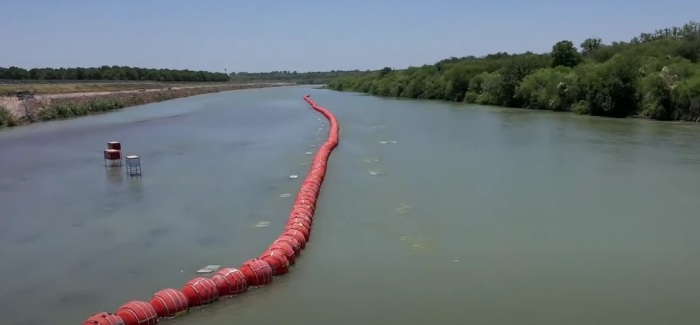Texas must remove floating barriers on Rio Grande, judge rules

A federal judge has ruled that Texas can't have a floating barrier on the Rio Grande without permission from the federal government, a victory for the Biden administration that the state has vowed to appeal.
U.S. District Judge David Alan Ezra of the Western District of Texas, Austin Division, issued a preliminary injunction Wednesday ordering Texas to remove a 1,000-foot buoy barrier along the Rio Grande by Sept. 15.
In July, under the directive of Gov. Greg Abbott, Texas deployed the buoy barrier as a way to curb illegal entry into the United States amid an increase in border crossings in recent years. The U.S. Department of Justice argued that the buoys were installed in violation of the Rivers and Harbors Appropriation Act because they were placed without permission from the United States Army Corps of Engineers.
"Governor Abbott announced that he was not 'asking for permission' for Operation Lone Star, the anti-immigration program under which Texas constructed the floating barrier. Unfortunately for Texas, permission is exactly what federal law requires before installing obstructions in the nation's navigable waters," wrote Ezra, an appointee of former President Ronald Reagan.
Ezra rejected Texas' claims that the barrier was justified in stopping a wave of undocumented immigration, writing that "courts of appeals have uniformly declined to consider whether and when an 'invasion' occurs because of illegal immigration, as it 'involves matters of foreign policy and defense,' which the Constitution specifically commits to the federal government."
"Under this logic, once Texas decides, in its sole discretion, that it has been invaded, it is subject to no oversight of its 'chosen means of waging war'… Such a claim is breathtaking," continued Ezra.
Associate Attorney General Vanita Gupta of the U.S. Department of Justice praised the preliminary injunction.
"We are pleased that the court ruled that the barrier was unlawful and irreparably harms diplomatic relations, public safety, navigation, and the operations of federal agency officials in and around the Rio Grande," said Gupta in a statement.
The Texas Office of the Governor vowed to appeal the decision, declaring that the ruling "merely prolongs President Biden's willful refusal to acknowledge that Texas is rightfully stepping up to do the job that he should have been doing all along."
"This ruling is incorrect and will be overturned on appeal," the governor's office declared in a statement. "We will continue to utilize every strategy to secure the border, including deploying Texas National Guard soldiers and Department of Public Safety troopers and installing strategic barriers," the governor's office said in a statement.
"Our battle to defend Texas' sovereign authority to protect lives from the chaos caused by President Biden's open border policies has only begun. Texas is prepared to take this fight all the way to the U.S. Supreme Court."
Texas and the Biden administration have had considerable differences over immigration policy for the U.S. southern border with Mexico, which has seen a significant increase in illegal migration since Biden took office. In the first 10 months of fiscal year 2023, U.S. Customs and Border Protection reported nearly 2 million encounters with illegal immigrants at the southwest border.
According to preliminary data from The Washington Post, a record number of migrants crossed the southern border in August. There were reportedly 177,000 arrests along the Mexico border last month, an increase from 132,652 in July and 99,539 in June. U.S. Border Patrol arrested at least 91,000 migrants who entered the country as part of a family group in August.
A DHS spokesperson told the outlet that the increases are part of "seasonal trends" and the government has repatriated over 17,000 parents and children who crossed the border as families since May.
In June, the U.S. Supreme Court ruled 8-1 against Texas and Louisiana in their lawsuits against the Biden administration over 2021 immigration guidelines from the U.S. Department of Homeland Security.
Justice Brett Kavanaugh authored the majority opinion, concluding that the states did not have standing to sue the federal government over the guidelines, which curbed the extent to which detention could be used on those who illegally entered the country.
"The States have not cited any precedent, history, or tradition of courts ordering the Executive Branch to change its arrest or prosecution policies so that the Executive Branch makes more arrests or initiates more prosecutions. On the contrary, this Court has previously ruled that a plaintiff lacks standing to bring such a suit," wrote Kavanaugh.





























